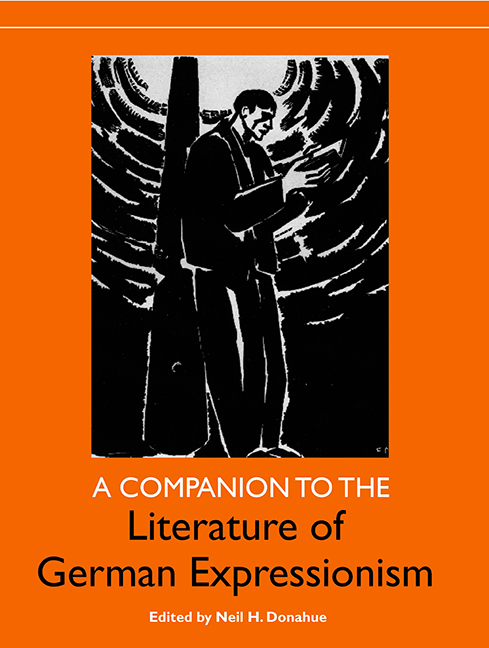Book contents
- Frontmatter
- Contents
- List of Illustrations
- Preface and Acknowledgments
- Chronology
- Introduction
- Philosophical Background
- Prose
- Poetry
- 5 Menschheitsdämmerung: The Aging of a Canon
- 6 Choric Consciousness in Expressionist Poetry: Ernst Stadler, Else Lasker-Schüler, Georg Heym, Georg Trakl, Gottfried Benn
- 7 Performing the Poem: Rituals of Activism in Expressionist Poetry
- Drama
- Interdisciplinary
- Select Bibliography
- Notes on the Contributors
- Index
7 - Performing the Poem: Rituals of Activism in Expressionist Poetry
from Poetry
Published online by Cambridge University Press: 28 April 2017
- Frontmatter
- Contents
- List of Illustrations
- Preface and Acknowledgments
- Chronology
- Introduction
- Philosophical Background
- Prose
- Poetry
- 5 Menschheitsdämmerung: The Aging of a Canon
- 6 Choric Consciousness in Expressionist Poetry: Ernst Stadler, Else Lasker-Schüler, Georg Heym, Georg Trakl, Gottfried Benn
- 7 Performing the Poem: Rituals of Activism in Expressionist Poetry
- Drama
- Interdisciplinary
- Select Bibliography
- Notes on the Contributors
- Index
Summary
Of the twenty-three poets Kurt Pinthus included in his anthology Menschheitsdämmerung (Dawn of Humanity, 1920), only Benn, Lasker-Schüler, Heym, Stadler, and Trakl belong to the canon of German lyric poetry. According to general opinion, only these poets transcend the level of autoreferentiality; the others are sometimes labeled minor to the point of “iconoclastic barbarians” (Waller, 2) or their expressionistic beginnings deemed unpalatable for the present literary taste, as in the case of Franz Werfel. Their poetry seemed without the formal complexity, significance, and integrity attributed to those others in the canon, and instead seemed merely expressions of political activism or overweening pathos. In order to do justice to these poets, however, one must understand the complexity of the socio-political and literary situation in Germany between 1900 and 1910. Expressionists decried not only the bourgeois society, but also the contemporary art of Impressionism, l'art pour l'art or aestheticism, for avoiding social relevance by way of aesthetic forms that had become empty clichés. Accordingly, Pinthus characterizes the unifying stylistic traits as follows: “Niemals war das Ästhetische und das L'art pour l'art-Prinzip so mißachtet wie in dieser Dichtung, die man die ‘jüngste’ oder ‘expressionistische’ nennt, weil sie ganz Eruption, Explosion, Intensität ist — sein muß, um jene feindliche Kruste zu sprengen” (MHD, 29; Never before were aesthetics and the principle of l'art pour l'art as disdained as in this poetry, which is called the “newest” or “expressionist” because it is eruption, explosion, intensity — has to be in order to burst that hostile crust”; DoH, 35). With the title Menschheitsdämmerung (“Dawn of Humanity,” or, more exactly, “Twilight of Humanity”), Pinthus consciously refers to the correlation of apocalypse and renewal as the principle tenor of the Expressionist movement (30), but he does not distinguish between the religious concept of the apocalypse as the end of history and just punishment for humanity's sins, on the one hand, and political revolution for the sake of social progress, on the other. Gerhard Kaiser maintains that the Expressionists as a whole belong to the former camp (509). But he also shies away from an exhaustive investigation of the period of Expressionism as such (880). In contrast, however, some poet-activists indeed had intended to revolutionize society, though not necessarily along the lines of Marxist ideology; however, their proposed renewal was not simply spiritual.
- Type
- Chapter
- Information
- A Companion to the Literature of German Expressionism , pp. 185 - 228Publisher: Boydell & BrewerPrint publication year: 2005



